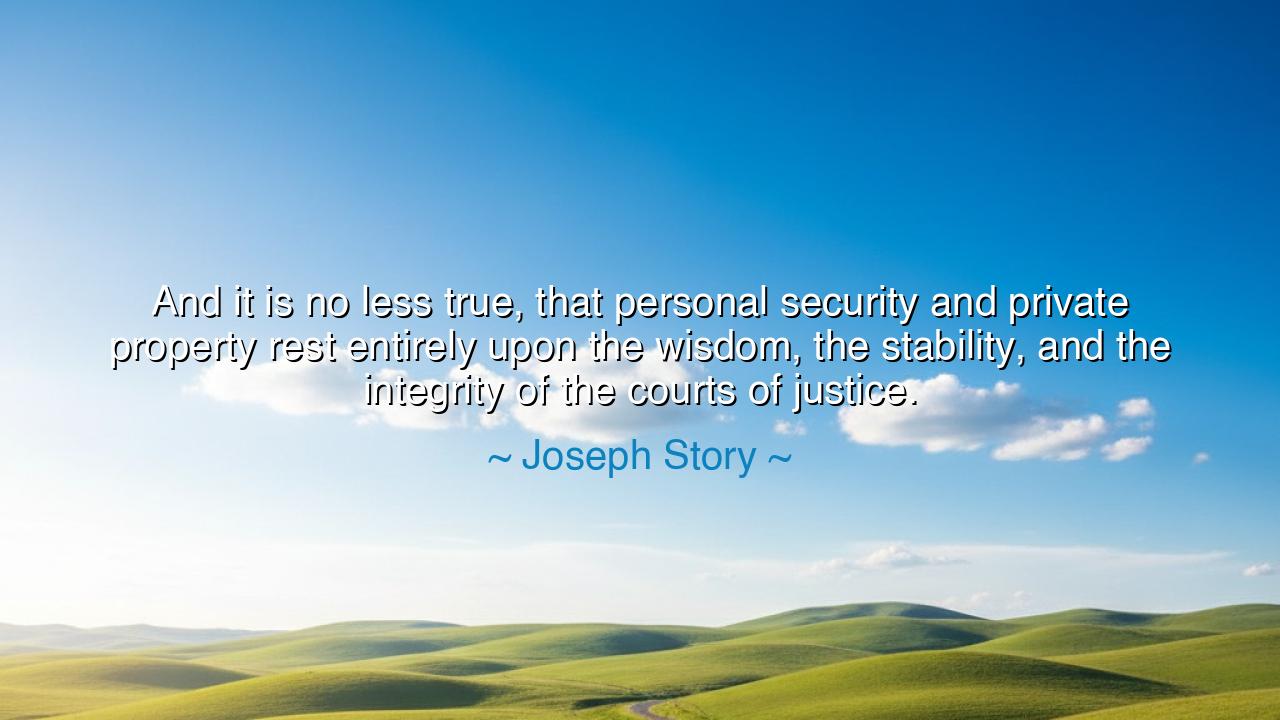
And it is no less true, that personal security and private
And it is no less true, that personal security and private property rest entirely upon the wisdom, the stability, and the integrity of the courts of justice.






Joseph Story, jurist and guardian of the republic’s law, declared with solemn clarity: “And it is no less true, that personal security and private property rest entirely upon the wisdom, the stability, and the integrity of the courts of justice.” In this proclamation he reveals the foundation of a free society: not armies, nor kings, nor wealth, but the courts of justice. For it is only through their wisdom, their stability, and their integrity that men may live secure in their lives and possessions.
The meaning is plain yet profound. Without wisdom, judges may twist the law into folly; without stability, justice shifts with the wind of passion and power; without integrity, the courts themselves become thieves clothed in robes. Story reminds us that the very breath of liberty—personal security and private property—is sustained only so long as justice remains uncorrupted. Where the courts fail, society collapses into fear, for no man can rest secure in his home or in his life.
History offers vivid proof. In the waning days of the Roman Republic, corruption infected the courts, and justice became the servant of the powerful. The poor found no defense, the wealthy manipulated verdicts, and soon the republic fell into tyranny. By contrast, the young United States, guided by men like Story, sought to make the Supreme Court a pillar, where reason and equity would stand above faction. Landmark cases such as Marbury v. Madison established that justice, when rooted in integrity, could restrain even the highest powers.
This truth also serves as a warning. Nations may build walls, raise armies, and coin wealth, but without just courts, all is fragile. Tyrants may seize power not by overthrowing armies but by corrupting the law, turning it into a weapon against the very people it should protect. Story’s words call us to vigilance, reminding us that the strength of a nation is not measured only by its might, but by the incorruptible fairness of its judges.
Therefore, let the seeker of wisdom honor the courts of justice, and demand in them wisdom, stability, and integrity. For these are the guardians of liberty and the defenders of peace. If they stand firm, personal security and private property are safe; if they fall, no fortress can protect the people from chaos and oppression. Story’s lesson endures across generations: the law must be not a cloak for power, but a shield for the weak and a balance for the strong.






6P6thang12 Phuong
What strikes me most here is the connection between private property and moral governance. It suggests that wealth and security don’t just come from economic power but from fair and reliable legal systems. It makes me question: can true justice exist in societies where courts favor the powerful? The quote feels like both an observation and a challenge—to ensure that justice remains a shield for everyone, not a privilege for a few.
PA04.Nguyen Thi Phuong Anh-8a1
This line really underscores the fragility of legal systems. It makes me think about how dependent societies are on the honesty and insight of judges and lawmakers. When corruption or bias enters the courts, the entire structure of personal freedom begins to crumble. I wonder whether Joseph Story saw this as a warning to future generations—to protect the moral and intellectual independence of the judiciary above all else.
C.12.Le Minh Chau .7.10
I find this quote thought-provoking because it links moral values directly with social order. It suggests that fairness and competence in the courts are what make safety and prosperity possible. But I’m curious—how do we measure ‘wisdom’ or ‘integrity’ in a system made up of fallible humans? Can institutions maintain moral strength without constant reform, or does stability sometimes come at the cost of justice and adaptability?
UGUser Google
This statement feels incredibly relevant even today. It highlights how much trust we place in the judicial system—not just for justice, but for the foundation of our rights and freedoms. But I wonder, what happens when that trust erodes? If the courts lose their stability or integrity, doesn’t that threaten the very idea of security and property ownership? It’s a reminder that justice isn’t abstract—it’s the bedrock of civilized life.